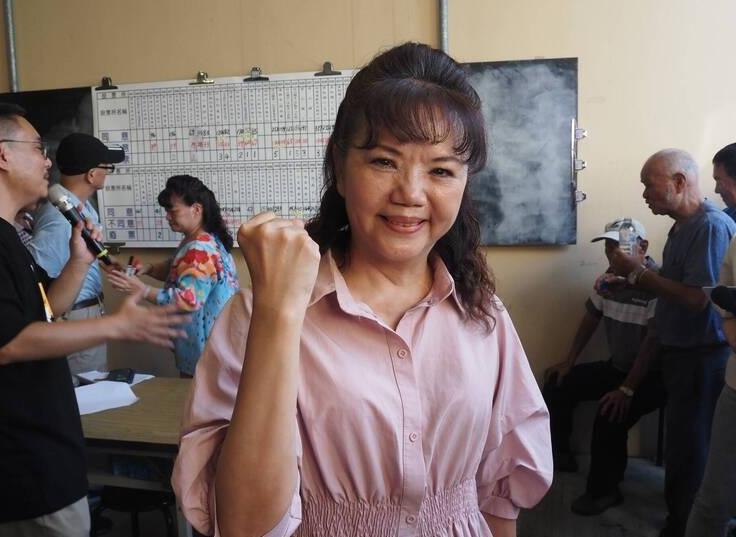Nantou County Councilor Chen Yu-ling (陳玉鈴) of the Democratic Progressive Party (DPP) yesterday survived a recall vote to remove her from office, the Central Election Commission (CEC) said in a news release.
According to the ballot results, 12,160 voters supported the recall, while 5,867 opposed it, for a total of 18,027 valid votes out of 18,171 cast.

Photo: Chen Feng-li, Taipei Times
The CEC said this represented a voter turnout of 31.76 percent of the 57,207 eligible voters.
Although 67.45 percent of valid ballots supported the recall, it failed to pass as the number of favorable votes did not exceed one-quarter of all eligible voters, which is the legal threshold for a recall under the Public Officials Election and Recall Act (公職人員選舉罷免法), the CEC said.
The act also stipulates that when a recall is not passed, the same person cannot be recalled for the remainder of his or her term in office, the CEC said.
According to the commission, the recall results would be reviewed and officially announced on Friday.
Nantou County Commissioner Hsu Shu-hua (許淑華) of the Chinese Nationalist Party (KMT) said the recall received more support than opposition, indicating that many voters want President William Lai (賴清德) and the DPP to reflect on their governance.
She also said the election system needed review, as Chen only needed about 5,000 votes to be elected a councilor, but nearly 15,000 votes were required to recall her.
Meanwhile, Chen thanked her constituents for their support.
In response to the votes supporting her recall, Chen said she would "deeply reflect" on her shortcomings.
Upcoming recall votes include 24 targeting lawmakers from the KMT, as well as one for suspended Hsinchu mayor Ann Kao (高虹安) of the Taiwan People's Party scheduled for July 26.
Additional votes for KMT legislators Ma Wen-chun (馬文君) and Yu Hao (游顥) in Nantou County are set for Aug. 23.
Recall proposals for five other KMT lawmakers — Lo Ming-tsai (羅明才), Johnny Chiang (江啟臣), Yang Chiung-ying (楊瓊瓔), Yen Kuan-heng (顏寬恒) and Lin Szu-ming (林思銘) — are still under review by the CEC and could be decided as early as Friday.

Taiwanese can file complaints with the Tourism Administration to report travel agencies if their activities caused termination of a person’s citizenship, Mainland Affairs Council Minister Chiu Chui-cheng (邱垂正) said yesterday, after a podcaster highlighted a case in which a person’s citizenship was canceled for receiving a single-use Chinese passport to enter Russia. The council is aware of incidents in which people who signed up through Chinese travel agencies for tours of Russia were told they could obtain Russian visas and fast-track border clearance, Chiu told reporters on the sidelines of an event in Taipei. However, the travel agencies actually applied

New measures aimed at making Taiwan more attractive to foreign professionals came into effect this month, the National Development Council said yesterday. Among the changes, international students at Taiwanese universities would be able to work in Taiwan without a work permit in the two years after they graduate, explainer materials provided by the council said. In addition, foreign nationals who graduated from one of the world’s top 200 universities within the past five years can also apply for a two-year open work permit. Previously, those graduates would have needed to apply for a work permit using point-based criteria or have a Taiwanese company

The Shilin District Prosecutors’ Office yesterday indicted two Taiwanese and issued a wanted notice for Pete Liu (劉作虎), founder of Shenzhen-based smartphone manufacturer OnePlus Technology Co (萬普拉斯科技), for allegedly contravening the Act Governing Relations Between the People of the Taiwan Area and the Mainland Area (臺灣地區與大陸地區人民關係條例) by poaching 70 engineers in Taiwan. Liu allegedly traveled to Taiwan at the end of 2014 and met with a Taiwanese man surnamed Lin (林) to discuss establishing a mobile software research and development (R&D) team in Taiwan, prosecutors said. Without approval from the government, Lin, following Liu’s instructions, recruited more than 70 software

BACK TO WINTER: A strong continental cold air mass would move south on Tuesday next week, bringing colder temperatures to northern and central Taiwan A tropical depression east of the Philippines could soon be upgraded to be the first tropical storm of this year, the Central Weather Administration (CWA) said yesterday, adding that the next cold air mass is forecast to arrive on Monday next week. CWA forecaster Cheng Jie-ren (鄭傑仁) said the first tropical depression of this year is over waters east of the Philippines, about 1,867km southeast of Oluanpi (鵝鑾鼻), and could strengthen into Tropical Storm Nokaen by early today. The system is moving slowly from northwest to north, and is expected to remain east of the Philippines with little chance of affecting Taiwan,